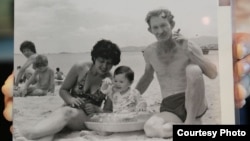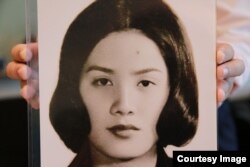BANGKOK —
Officials from a U.N. human rights commission on Thursday met with family members of a Thai woman gone missing since allegedly being abducted by North Korean spies in Macau in 1978. Despite the passage of time, the family is still hopeful she can eventually return home.
For years following the 1978 disappearance of Anocha Panjoy little attention was paid to her case, not even in her native Thailand.
But that changed in 2005 with the publication of a book by a U.S. soldier who had lived in North Korea for decades after deserting his post along the Korean DMZ in 1965.
After he left North Korea, Charles Robert Jenkins, claimed that he knew the Thai woman well and that she had been married twice in North Korea to foreigners. Jenkins said Anocha had been abducted from Macau, where she was employed as a masseuse, so she could be married to a foreigner in North Korea and teach the Thai language to the country's spies.
Anocha's brother, Sukham Panjoy, and nephew, Banjong Panjoy, met in Bangkok Thursday with officials of the United Nations Commission of Inquiry on Human Rights in the Democratic People's Republic of Korea.
Anocha's family members say they were encouraged by the meeting because commission officials told them the evidence is strong that Anocha was abducted and her case will be included in a report presented next March to the world body's Human Rights Council.
Banjong told VOA he and his uncle hope this leads to an eventual reunion with Anocha.
Banjong said international organizations, such as the United Nations and Japanese groups concerned about human rights issues, have given the family a lot of help and that gives them hope they will see Anocha again one day.
Anocha's surviving relatives have previously appealed in a letter to the leadership in Pyongyang to release her, who, if alive, would be 59 years old.
Since 2005, Thailand's Foreign Ministry has repeatedly requested information about Anocha from North Korean diplomats in high-level bilateral meetings. But Pyongyang has consistently denied the woman has ever been in the country.
Anocha's nephew is not happy with Thailand's official handling of the case.
Banjong said the Thai government has paid very little attention to the family's problem and still does not seem to believe that Anocha is really in North Korea.
A ministry official told VOA that Anocha's 1978 disappearance from Macau is treated as a missing person's case because there is "no other corroborating independent evidence" -- other than Jenkins' book and a photograph of an Asian woman sitting behind Jenkins, his wife and child on an unidentified beach.
Family members say they and her friends are convinced the woman in the 1984 photograph, supplied by Jenkins, is indeed Anocha.
For years following the 1978 disappearance of Anocha Panjoy little attention was paid to her case, not even in her native Thailand.
But that changed in 2005 with the publication of a book by a U.S. soldier who had lived in North Korea for decades after deserting his post along the Korean DMZ in 1965.
After he left North Korea, Charles Robert Jenkins, claimed that he knew the Thai woman well and that she had been married twice in North Korea to foreigners. Jenkins said Anocha had been abducted from Macau, where she was employed as a masseuse, so she could be married to a foreigner in North Korea and teach the Thai language to the country's spies.
Anocha's brother, Sukham Panjoy, and nephew, Banjong Panjoy, met in Bangkok Thursday with officials of the United Nations Commission of Inquiry on Human Rights in the Democratic People's Republic of Korea.
Anocha's family members say they were encouraged by the meeting because commission officials told them the evidence is strong that Anocha was abducted and her case will be included in a report presented next March to the world body's Human Rights Council.
Banjong told VOA he and his uncle hope this leads to an eventual reunion with Anocha.
Banjong said international organizations, such as the United Nations and Japanese groups concerned about human rights issues, have given the family a lot of help and that gives them hope they will see Anocha again one day.
Anocha's surviving relatives have previously appealed in a letter to the leadership in Pyongyang to release her, who, if alive, would be 59 years old.
Since 2005, Thailand's Foreign Ministry has repeatedly requested information about Anocha from North Korean diplomats in high-level bilateral meetings. But Pyongyang has consistently denied the woman has ever been in the country.
Anocha's nephew is not happy with Thailand's official handling of the case.
Banjong said the Thai government has paid very little attention to the family's problem and still does not seem to believe that Anocha is really in North Korea.
A ministry official told VOA that Anocha's 1978 disappearance from Macau is treated as a missing person's case because there is "no other corroborating independent evidence" -- other than Jenkins' book and a photograph of an Asian woman sitting behind Jenkins, his wife and child on an unidentified beach.
Family members say they and her friends are convinced the woman in the 1984 photograph, supplied by Jenkins, is indeed Anocha.






